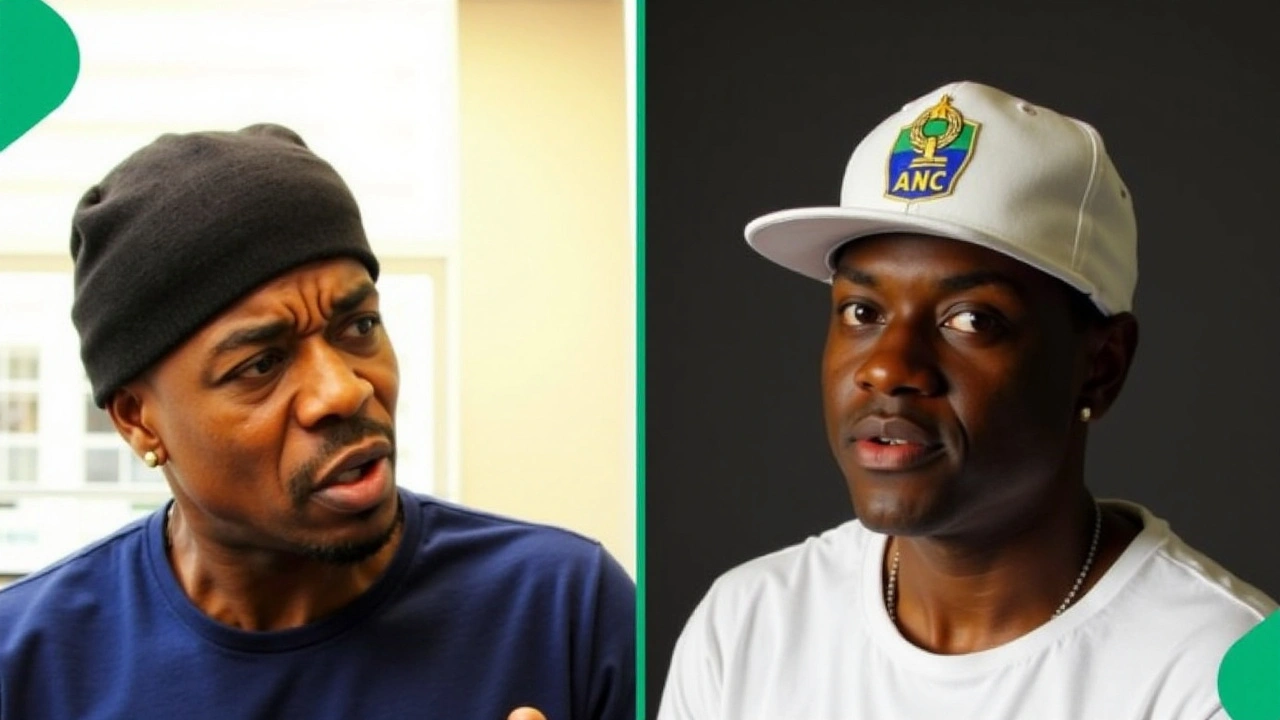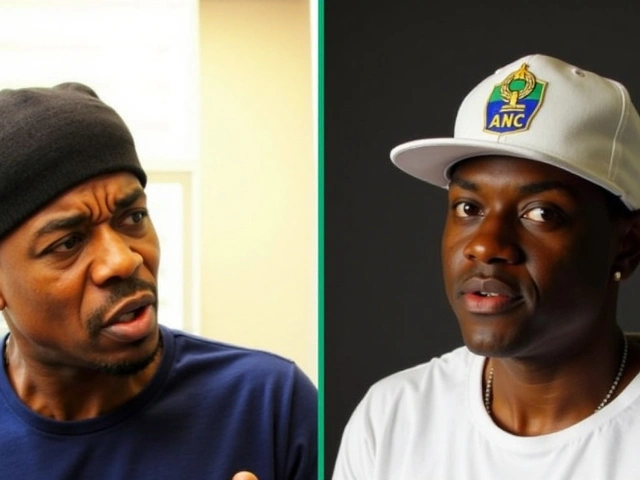Longwe Twala: A Tale of Talent Wasted and Legal Woes
Longwe Twala, the son of the celebrated music producer Sello 'Chicco' Twala, continues to languish behind bars with no immediate signs of freedom. The junior Twala was recently arrested under allegations of theft, specifically for purportedly stealing studio equipment valued at over R300,000 from his father's residence in Fourways, Johannesburg. The incident unfolded while Chicco was out of the country, leaving behind a question mark on the sanctity of trust and familial relationships.
The Alleged Crime and Legal Proceedings
Chicco Twala, a name synonymous with South African music, was left in a dilemma after the reported theft. On discovering the theft, he promptly opened a case of robbery and theft against both his sons, Longwe and Sello, at the Douglasdale Police Station. However, the charges against Sello were dismissed due to inadequate evidence, leaving Longwe to face the brunt of the law alone.
The subsequent courtroom proceedings have attracted considerable public scrutiny, especially after Longwe's disheveled and unrecognizable appearance during a recent court hearing went viral on social media. The public's eyes are glued to Longwe's case, with mixed reactions and emotions about the unfolding drama. Many perceive this situation as a tragic narrative of a parent's anguish over a child's persistent descent into criminality, driven by a deep-seated addiction.
Sello 'Chicco' Twala's Stand
Expressing his frustration and heartbreak, Sello 'Chicco' Twala has publicly aired his struggles with his son's recurring criminal behavior and drug addiction. Despite countless efforts to aid Longwe, including more than 30 stints in various rehabilitation centers, Chicco now feels that incarceration might be the only deterrent left. He has candidly stated that he prefers his son in jail rather than watching him continue his downward spiral into the depths of addiction and crime.
The Courtroom Drama
The legal proceedings, however, have hit another snag with the theft case against Longwe being postponed. The delay, according to court officials, is to provide investigators with ample time to verify Longwe's residential address, conduct comprehensive bail investigations, and confirm the details of his legal aid representation. As the wheels of justice turn slowly, Longwe remains in custody, his fate uncertain.
Public and Media Reaction
Public opinion on this matter is anything but uniform. On one side, there are sympathizers who see Longwe as a victim of addiction, needing support and rehabilitation more than a prison sentence. They view Chicco’s decision as harsh but understandable given his desperation. On the other hand, critics argue that Longwe’s continued criminal activities warrant a firm legal response to prevent further societal harm.
The media's portrayal of Longwe's case has only intensified the public discourse. Headlines flash his notoriety, and social networks buzz with debates, memes, and opinions, all adding layers to an already complex family saga.
The Broader Context
This incident isn't happening in isolation. South Africa has battled with the social and economic effects of drug addiction for years, and Longwe Twala's story mirrors larger societal struggles. Thousands of families grapple with similar issues, trying to reconcile love for an addicted relative with the need for strict measures to curtail criminal activities.
What Lies Ahead?
The upcoming days are critical for Longwe Twala as his legal team gears up for the postponed court hearing. The outcome will likely determine the course of not just Longwe's immediate future, but perhaps his long-term path to recovery. It also remains to be seen whether Chicco’s tough-love approach can serve as a turning point for his son or if it will deepen the chasm between them.
In the end, this gripping story of legal entanglement, personal tragedy, and public scrutiny is far from over. It's a poignant reminder of the complicated nature of addiction, the challenging choices faced by families, and the slow gears of justice that must balance the scales fairly and empathetically.
Final Thoughts
As Longwe Twala awaits his next court appearance, all eyes are on how the justice system will handle what is both a legal and human crisis. Families, social services, and legal entities must come together to navigate these murky waters, ensuring that individuals like Longwe receive the support they need while upholding the rule of law. His story compels us to reflect not just on crime and punishment, but also on the deeper societal issues that fuel such tragedies.
For now, Longwe remains in custody, a tragic figure caught in the crossfire of his actions and his father's tough-love approach. His future remains uncertain, and the public continues to watch with bated breath, hoping for a resolution that brings both justice and healing.



Comments
What a hearthbreaking situation for the whole family.
Longwe’s repeated bailouts reveal a pattern of privilege that shields him from accountability, and the system’s leniency only fuels his destructive habits.
The case exemplifies systemic lapses in post‑incarceration reintegration frameworks, underscored by inadequate support mechanisms for substance‑dependent offenders.
🤷♀️ It’s sad seeing talent wasted, but maybe this is a wake‑up call for his family. 🙏
Keep pushing forward no matter the odds you’ll find strength inside
The saga of Longwe Twala is not merely a celebrity scandal but a microcosm of the broader societal struggle with addiction and recidivism. When a well‑known family attempts to navigate the treacherous waters of the criminal justice system, the public gaze becomes an unforgiving spotlight. In South Africa, the intersection of drug dependence and property crime has been documented in numerous sociological studies that highlight systemic gaps. One such gap is the scarcity of culturally sensitive rehabilitation programs that can address both psychological and socioeconomic dimensions of addiction. Moreover, the reliance on punitive measures, as illustrated by Chicco’s preference for incarceration, often overlooks evidence‑based alternatives that foster sustainable recovery. The legal apparatus, while tasked with upholding the rule of law, must also grapple with the ethical imperative to protect vulnerable individuals from self‑destruction. It is noteworthy that Longwe’s repeated attempts at detoxification have been met with limited success, suggesting that the current modalities may be ill‑suited to his specific needs. From a policy perspective, integrating a continuum of care that bridges detox, outpatient counseling, and community reintegration could mitigate the risk of reoffending. Furthermore, the role of family dynamics cannot be understated; parental involvement, when balanced with professional oversight, can serve as a catalyst for change. Yet, the public narrative often polarizes the discourse into binary positions of blame versus sympathy, thereby obscuring the nuanced reality. Scholars argue that media framing that sensationalizes such cases may inadvertently reinforce stigma, which in turn hampers access to support services. In light of these considerations, a multidisciplinary task force comprising legal experts, psychologists, and community leaders would be an optimal strategy. Such a collaborative approach would allow for individualized treatment plans that respect the subject’s cultural background while addressing his legal obligations. Ultimately, the hope is that Longwe’s journey, while fraught with setbacks, could evolve into a testament of resilience and systemic reform. Only through compassionate yet decisive action can we hope to transform tragedy into a blueprint for the future.
While some celebrate tough love, it’s evident that unchecked permissiveness earlier in life set the stage for this outcome.
The postponement underscores procedural diligence, yet it also prolongs the anguish for all parties involved.
Longwe needs real help not just a cell his family should step up and push for better rehab
The legal delays hint at deeper corruption where influential families manipulate outcomes behind closed doors.
Integrative treatment models that combine psychosocial support with vocational training could drastically reduce recidivism rates.
Every setback is a setup for a comeback – hope shines even in the darkest moments.
It is imperative to recognize that addiction is not a moral failing but a complex neurobiological disorder that demands empathy and evidence‑based interventions; therefore, the community must rally around Longwe with resources rather than ostracize him, and policymakers should allocate funding toward comprehensive rehabilitation infrastructures that address both the individual and societal dimensions of substance abuse.
The media’s relentless hype distracts from the root causes, reducing a painful family crisis to a click‑bait headline.
It's a tough story but maybe it sparks needed conversation about rehab and justice